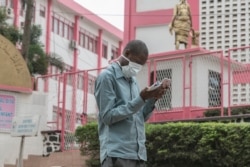Africa security experts say efforts to fight the coronavirus pandemic has been complicated by armed conflicts on the continent. Calls are growing for cease-fires to give health care workers safe access to all those at risk.
As African nations gear up and lock down to fight the spread of the coronavirus, security experts say armed conflicts across the continent are hampering efforts.
Vladimir Antwi-Danso, the dean of academic affairs at the Ghana Armed Forces Command and Staff College, says the virus poses additional problems for African countries in conflict.
“Those countries experiencing war throughout the world are at great risk because already, there are no good systems in place, and where there are no good systems, combating the virus or combating the epidemic has been found to be very disturbing,” he said.
There are at least 15 armed conflicts across Africa and almost all nations on the continent have confirmed cases of the coronavirus.
There are growing fears that the most vulnerable will be worst affected by both conflict and the respiratory disease caused by the virus, COVID-19.
Last week, United Nations Secretary-General Antonio Guterres appealed for a global cease-fire to help stop the coronavirus, calling it the world’s common enemy.
The U.N. chief said safe corridors were required for health workers and to bring life-saving aid to those in need.
John Campbell, a senior fellow for Africa policy studies at the Council on Foreign Relations in Washington, D.C., says calls for cease-fires are well-meaning, but limited.
“After all, insurgencies most of the time think what they are being insurgent about, is more important than everything else,” he said.
Campbell says the coronavirus could also play to separatist movements by undermining confidence in governments.
However, one insurgency group declared its intention to adhere to the call for a cease-fire and also encouraged other separatists in Africa to do the same.
The Southern Cameroons Defense Forces (SCDF), one of the rebel groups fighting for an independent state in western Cameroon, said they had listened to the U.N. call.
SCDF spokesman Ebenezer Akwanga in a statement Monday said they would lay down their arms for two weeks to allow civilians to get tested for COVID-19.
Akwanga also leads the Organization of Emerging African States (OEAS), a group that offers advice to African separatists. Speaking from Ghana, he says rebel groups should not stop medical aid reaching people in need.
“The possibility could be created for international humanitarian workers to move into these war-torn zones and for these international humanitarian workers to be assured of their own safety and protection,” he said.
It did not appear that any other rebel groups fighting in Cameroon, or other African nations, agreed to cease-fire as clashes continued this week.
Akwanga says Africa’s front-line fighters need to understand that they are among those most at risk from the virus. He says people should come together to see the coronavirus as the common enemy that takes no prisoners.









